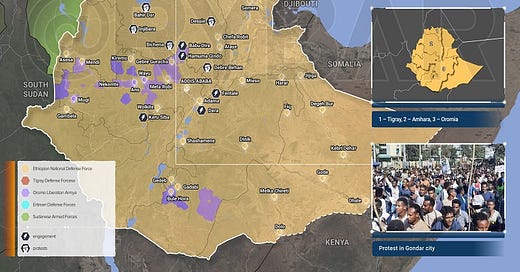It’s arguable whether Rybar accurately assessed Prime Minister Abiy's intentions, but what they concluded aligns with the prevailing narrative circulating around the Amhara Region and among anti-government activists right now. It portrays his policy as being driven by ulterior political-territorial motives instead of the innocent desire to sustainably stabilize the security situation prior to initiating the process for resolving Ethiopia’s many interregional disputes, which could potentially include referenda in some instances.
Rybar is one of Russia’s top Telegram channels with over one million subscribers, and it’s been cited by leading media across the world due to the reliability of its reporting as well as the astuteness of its analyses. Despite being independent of the Russian state, this channel approaches everything with its interpretation of Moscow’s interests in mind. For these reasons, its constructive critiques of Ethiopia’s military reorganization deserve to be reflected upon.
Everyone can read the original Russian-language post from Wednesday here, which can be automatically translated in the app itself or folks can simply employ Google Translate. Upon doing so, they’ll see that Rybar’s constructive critiques are summarized as follows:
* Their sources claim that Oromia’s over 300,000 regional forces have yet to be integrated;
* The TPLF hasn’t yet surrendered all heavy weaponry;
* These preceding points combine to worsen the Amhara’s “threat perception” of those two;
* Ethnically targeted attacks are still victimizing the Amhara, who feel more vulnerable than ever;
* The Somali Region is also assessed by Rybar as being unsupportive of the military reorganization too;
* There’s a chance that Al Shabaab could exploit unrest there to launch a cross-border terrorist offensive;
* And so too could other terrorist and rebel groups exploit events to go on the offensive elsewhere.
For these reasons, Rybar concluded that Prime Minister (PM) Abiy’s doubling down on this policy could be due to his desire to centralize power, after which he might make concessions towards the Oromia and Tigray Regions in order to win their loyalty (albeit at the Amhara’s expense, whether real or perceived).
It’s arguable whether they accurately assessed his intentions, but what they concluded aligns with the prevailing narrative circulating around the Amhara Region and among anti-government activists right now. It portrays PM Abiy’s policy as being driven by ulterior political-territorial motives instead of the innocent desire to sustainably stabilize the security situation prior to initiating the process for resolving Ethiopia’s many interregional disputes, which could potentially include referenda in some instances.
“Extremely Sensitive Differences Of Perception Are Responsible For Ethiopia’s Amhara Protests”, and the gap between that region’s people and the federal government appears to still be growing, at least from Rybar’s perspective. Returning back to its constructive critiques, despite them echoing the narratives circulating around the Amhara Region and among anti-government activists, they were arrived at independently and without any hidden agenda considering Russia’s status as Ethiopia’s historical partner.
The importance in pointing this out is that those conclusions might therefore have some credence to them seeing as how they’re now shared by the editorial staff that runs one of Russia’s top Telegram channels and can now no longer be dismissed purely as information warfare waged by the opposition. It’s up to Ethiopians themselves to resolve this dispute, not foreigners, and a pragmatic starting point might be for both sides to acknowledge the other’s perceptions despite still disagreeing with them.
From there, relevant representatives could discuss their respective differences in an attempt to clarify them with a view towards preventing any further escalations caused by this perception gap, with the resultant outcome of their meeting being the unveiling of a so-called “compromise perception”. The purpose of this would be to find some sort of middle ground between the two sides aimed at assuring their supporters that no foul play is afoot by either party, thus helping to assuage their concerns.
Without urgently restoring mutual trust even if only imperfectly, then there’s a credible risk that the latest events could spiral out of control into a self-sustaining cycle of destabilization, which all responsible stakeholders must do their utmost to preemptively avert. This will inevitably entail some difficult compromises, but it might be the only way to safely resolve the latest dispute. Hopefully everything will soon stabilize one way or another and Ethiopia can continue its post-war rehabilitation.




